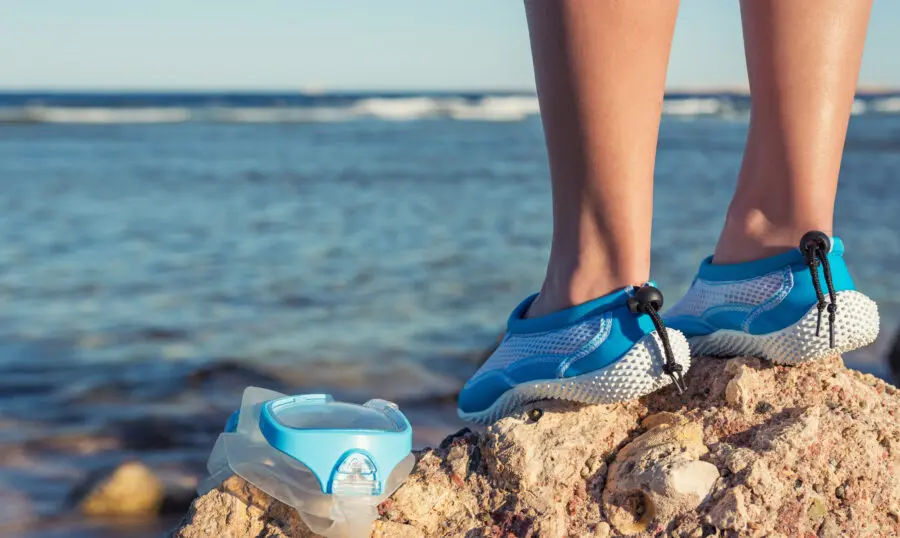
Even underwater, your feet deserve proper protection
Diving boots and socks help prevent cold, pressure injuries, and skin irritation from fins. Whether you’re new to diving or experienced, choosing the right footwear can improve comfort and safety. Whether you are a seasoned diver or this is your first time, you will need the proper equipment. Even though you are floating, your feet are vulnerable to a variety of hazards, which you should be aware of. What is the best way to protect them? What kind of footwear should you get? Before you begin, here’s what you should know.
Diving Boots vs Socks: Which Footwear for Your Dive?
It is just as important to protect your feet in the water as it is on land. Scuba diving, like jogging, hiking, and other activities, necessitates the use of appropriate footwear.
What kind of footwear should I put on then? Boots or socks? These two diving shoes have a similar look but are used differently:
- If you are going to wear fins, socks are the way to go – soft, slightly reinforced neoprene socks.
- Boots will be mandatory for adjustable fins. They have a true sole, reinforced heel, toe, and underfoot sections, and a zipper for putting them on, making them firmer.
Consider the temperature of the water you will be diving in once you have decided on a pair of diving footwear. The colder it gets, the more layers you will need. This varies from 1 to 7 mm for socks and 3 to 7 mm for boots.
Rock Boots or Diving Boots: Which to Choose for Underwater Safety?
What is the difference between rock boots and diving boots? Again, the resemblance is striking, but the application differs somewhat. Rock boots are similar to diving boots in that they are worn with adjustable fins, but they have more reinforced bottoms that give them a shoe-like appearance. They are great for walking on rocky terrain.
The term “rock boots” is frequently used in the industry to refer to diving boots, and this terminology can be misleading at times. Instead of focusing on the word, consider the form, reinforcements, material, and thickness of the shoe.
Finally, visit a podiatrist and a diving specialist before deciding on a model. The former’s inspection and the latter’s expert counsel will allow you to select diving shoes that are best suited for your foot morphology.
The importance of diving boots
Every day, you put on shoes to protect your feet from the elements and the risk of damage. You will need shoes that can walk in the winter, support you in the summer heat, and so on. Diving boots, likewise, give the required protection from the cold and the rubber of fins, which can irritate the skin.
It is vital to try on your diving boots before purchasing them. To avoid the problem that some divers experience when their feet get unnaturally enlarged, make sure they fit properly. When shoes do not fit correctly, they fill up with water and then hold it.
To dive safely, it is important to invest in premium equipment, from boots to fins to wetsuits.
What do podiatrists say about diving boots?
Your podiatrist will always advocate for quality in both material and fit, with any activity-specific footwear.
If you have a specific plantar problem, your podiatrist will be able to recommend one type of diving shoe over another based on your condition.That’s precisely why it’s wise to consult a podiatrist before making a purchase if you have a specific condition. Each individual, body, and foot is unique. These factors will influence the podiatrist’s decision.
FAQ About Diving Footwear: Booties, Socks, and Rock Boots
How Do Diving Socks and Boots Differ in Use?
Diving socks are softer and designed to be worn with full-foot fins, while diving booties are sturdier, with a rigid sole made for open-heel adjustable fins. Booties provide better protection on rough or rocky terrain. You can learn more about diving safety standards on the PADI website: https://www.padi.com
What Thickness for Neoprene Booties in Cold or Warm Water?
For warm water, a thickness of 1 to 3 mm is usually sufficient. For colder water, opt for models between 5 and 7 mm. Thickness is essential for proper thermal insulation.
Do I need a podiatrist’s opinion?
It’s not mandatory, but it’s highly recommended. A podiatrist can help assess your specific needs and prevent poor choices that may lead to discomfort or long-term injury.
Are rock boots essential for diving?
No, rock boots are mainly useful if you need to walk on hard or rocky surfaces. They’re closer to reinforced shoes and are not necessary for typical boat dives.
Can I use diving boots for other activities?
Yes, they can also be used for snorkeling, kayaking, or other aquatic activities. Just make sure they suit your needs in terms of flexibility, grip, and thickness.
The importance of protecting your feet even underwater
You must get well acquainted with the equipment, particularly the boots, before learning how to scuba dive. Boots or socks are required to protect your feet from damage, atmospheric pressure, and cold. You will be able to properly appreciate your adventure when you come well prepared.
If you have any doubts or a specific foot condition, consult a podiatrist from the PiedRéseau network before purchasing your diving footwear.